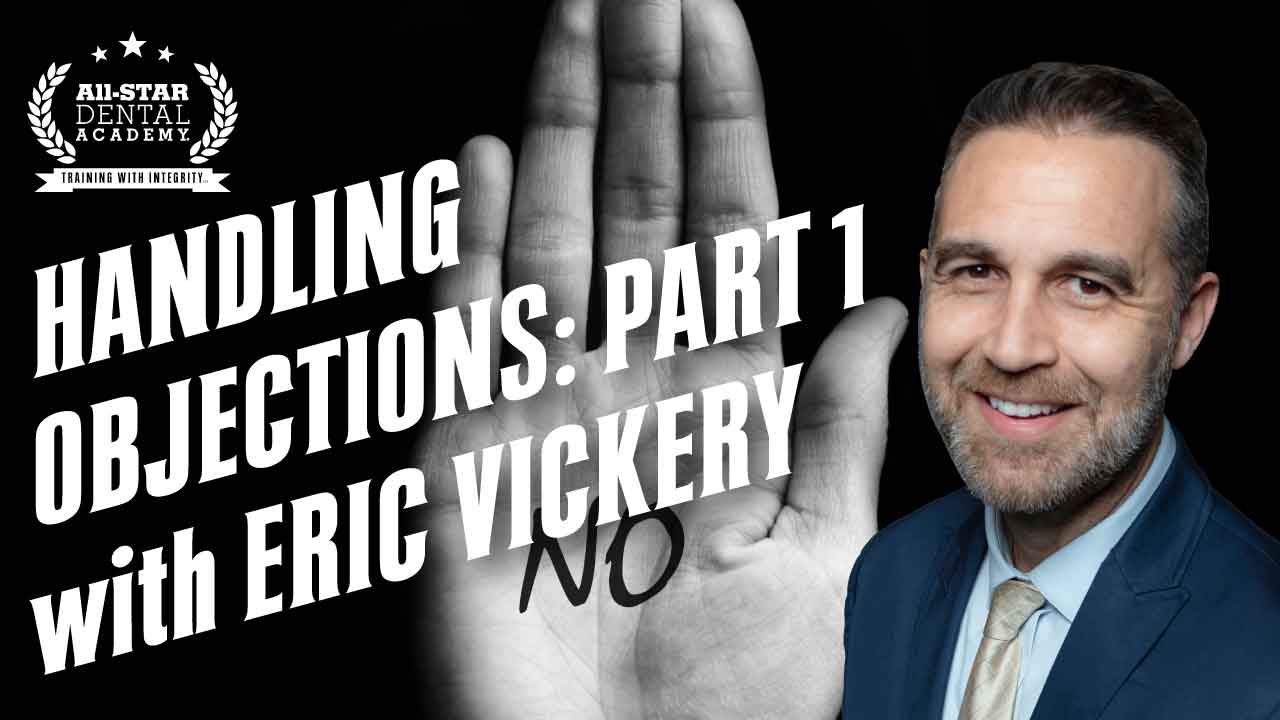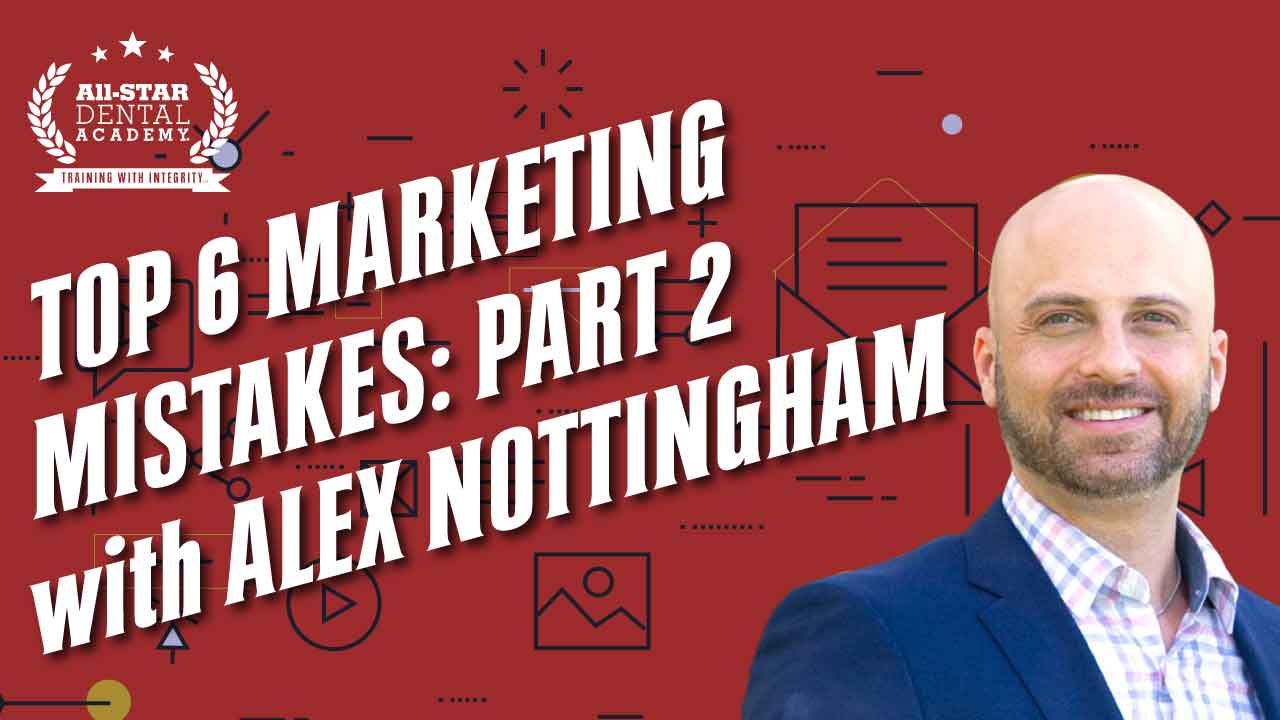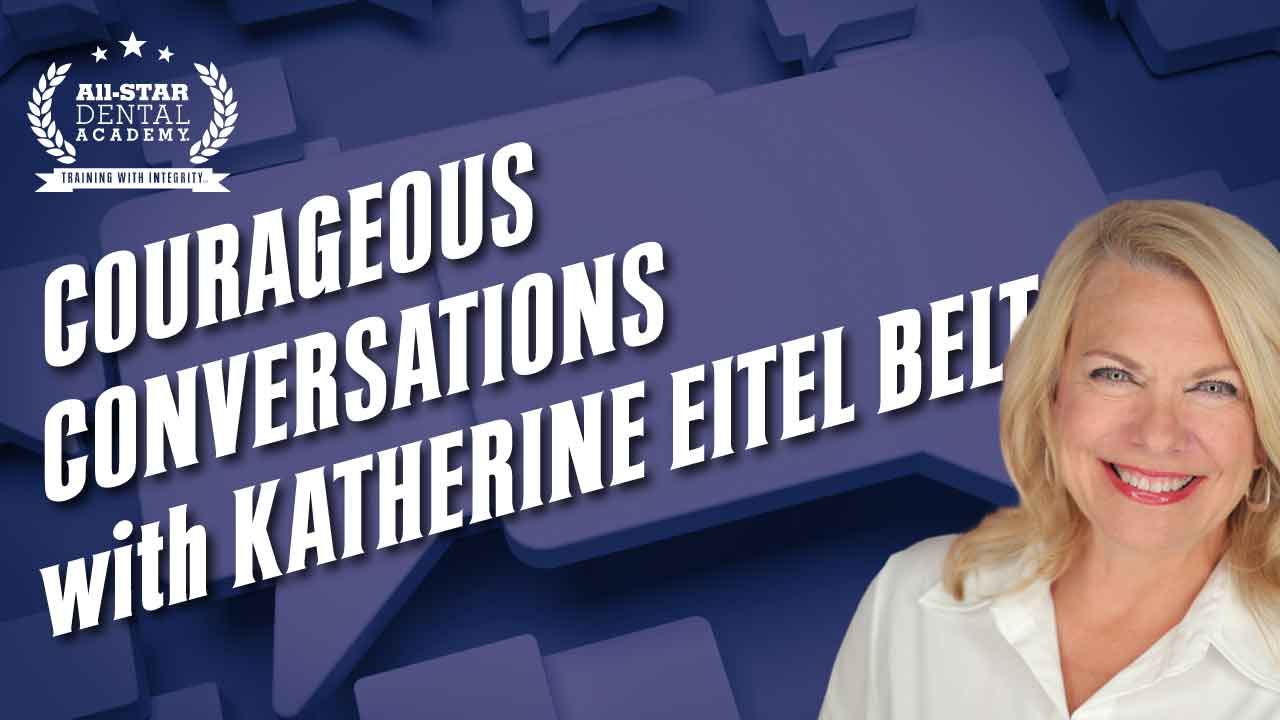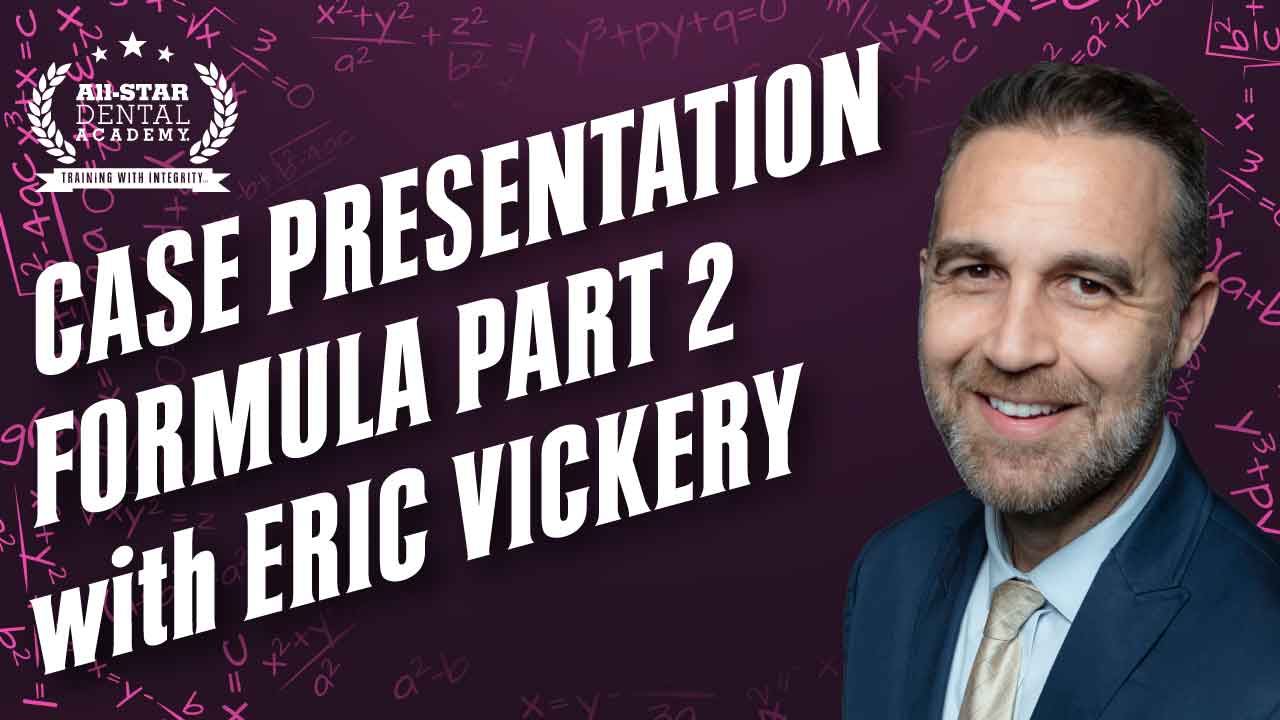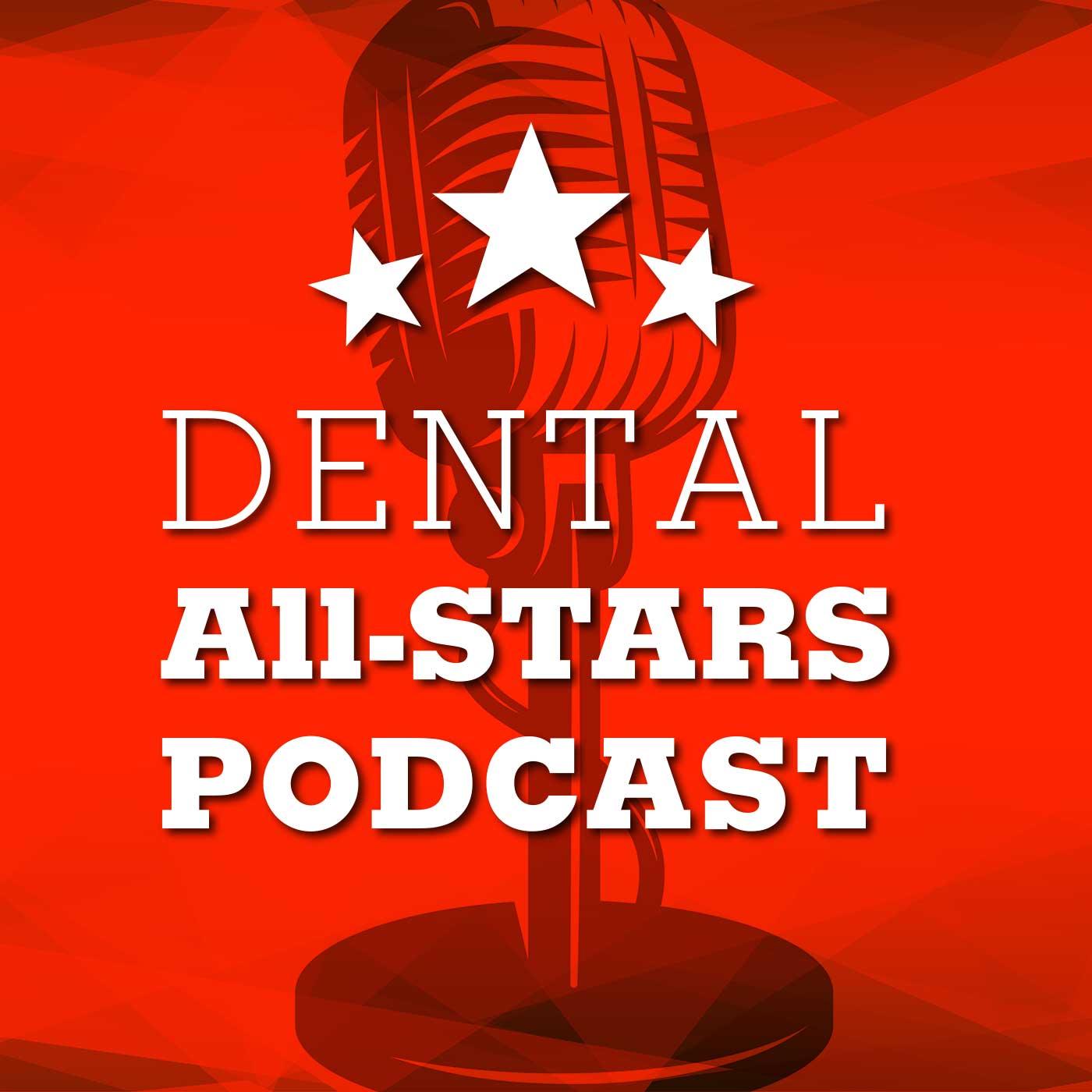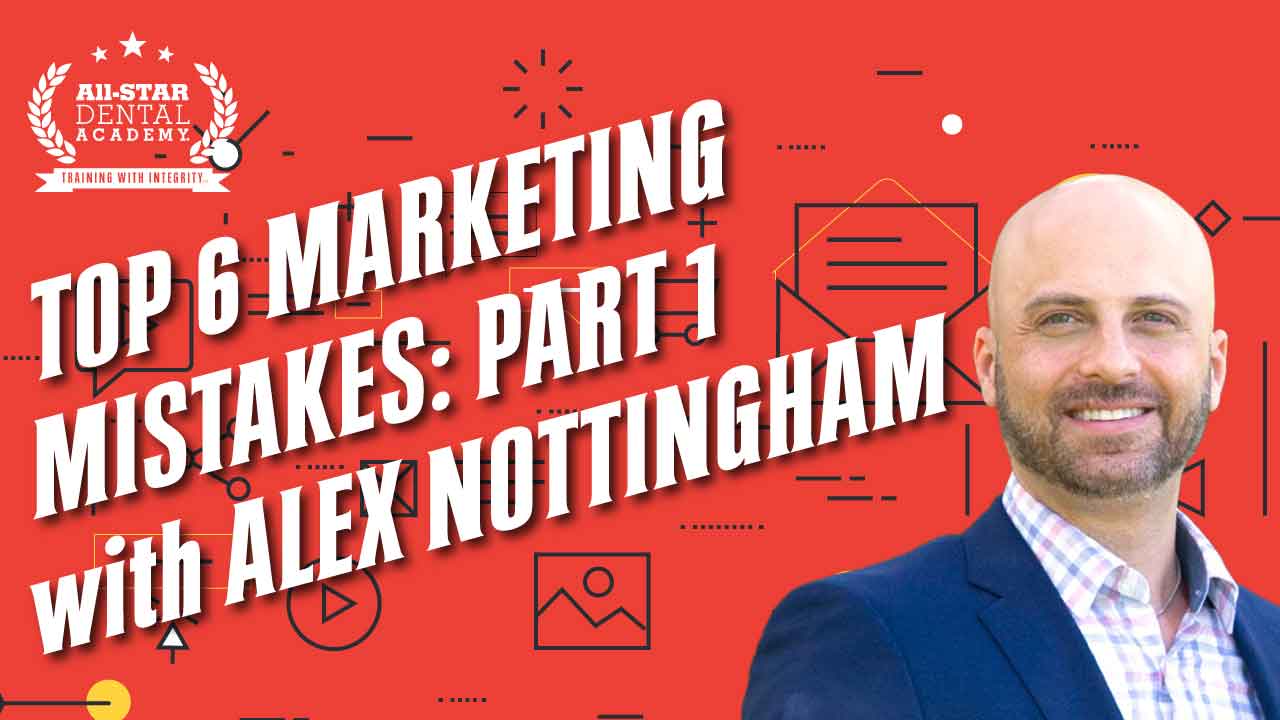Dentists often wonder why they don’t get more dental patient referrals. Why are they so haphazard? In this podcast, Larry Guzzardo, All-Star Dental Academy’s head instructor, discusses why patients don’t refer more often, how to encourage the team to get more referrals, how to track referrals, and using incentives to get more dental patient referrals.
“I think the number one reason why the team doesn’t ask for referrals more often is because there’s no role model for them, they don’t hear the doctor doing it.”
HIGHLIGHTS – Dental Patient Referrals
- [01:55] Why patient referrals don’t refer more often
- [04:26] What keeps the team from encouraging more referrals
- [08:03] Where team members “miss the boat” when it comes to encouraging referrals
- [12:13] Incentives for patients and team members
- [17:30] How to track patient referrals
- [19:01] Verbiage a team member can say to encourage a dental patient referral
- [21:27] The one thing you can put into play tomorrow to encourage dental patient referrals
QUOTES – Dental Patient Referrals
- [Referrals] are a mindset issue. I think people have something in their mind that says, if I do this, it’ll make me look like I’m needy, or if I ask for a referral, it means people will think I don’t have any patients.
- Believe it or not, patients expect us to ask them for a referral. They expect it.
- The number one reason why the team doesn’t do it more often is that there’s no role model for them because they don’t hear the doctor doing it themselves.
- We forget the team feels uncomfortable asking [for referrals]. And so they’re going to ignore any opportunity, for any reason.
- Create opportunities by showing the patient what you did. “We really are glad that you recognize the quality of work that we do. We work so hard to provide this for our patients. If you know anybody else who’d like to have the same type of treatment, we’d be happy to provide it for them too, if you wanted to tell them about us!”
About Larry Guzzardo
Larry is the head instructor and lead consultant at All-Star Dental Academy®. He is also a faculty member at the Dawson Academy. Larry speaks regularly to prestigious dental institutions, such as The Henman and Chicago Midwinter. His skills and talents lie in offering practical, common-sense solutions to improve dental practice productivity.
About Alex Nottingham JD MBA
Alex is the CEO and Founder of All-Star Dental Academy®. He is a former Tony Robbins top coach and consultant, having worked with companies upwards of $100 million. His passion is to help others create personal wealth and make a positive impact on the people around them. Alex received his Juris Doctor (JD) and Master of Business Administration (MBA) from Florida International University.
TRANSCRIPT – Dental Patient Referrals
Alex Nottingham, JD, MBA I like dental patient referrals and they’re not being generated. So what’s happening? What’s the disconnect between wanting more referrals and it not happening?
Larry Guzzardo You know, I think that’s a really good question. And I think the main thing here for everybody who’s listening is that it’s a mindset issue. I think, you know, people have something in their mind that says, if I do this, it’ll make me look like I’m needy, you know, or if I ask for a referral, it means people will think I don’t have any patients. Right? I don’t attract customers on my own. And so, what we have to learn to understand is that, believe it or not, patients expect us to ask them for a referral. They expect it. They want to refer to your office, but they don’t think that it’s okay to do it because nobody ever told them that it was okay.
So it’s a mindset issue. Number one, it does not make you look needy. It does not. I mean, if you went to a patient, go, please, please, please, I’m going to get in trouble if you don’t, you know, if you know, if you don’t refer to somebody, jump. Everybody gets in trouble. I’m not going to get a bonus, you know, if you do something like that, of course, people will think that you’re needy.
But there are opportunities that people can look for to encourage a referral. But the biggest thing that I would want people to remember is that patients are asking, are actually expecting you to ask them for a referral.
And believe it or not, they want to because they like your office, they enjoy you, they like the experience that they’re having. They just don’t know that it’s okay to tell their friends about your office. So that’s a lot of it. I think it has to do with what’s in between their two ears.
Alex Brilliant. So you’re saying that patients would like to refer, but they don’t have permission, perhaps, from the dentist or the team, or the mechanism to do it. And we have to be able to provide that. And the mindset problem with the dental office is maybe the fear of, like you said, appearing greedy or pushy or something to that effect.
And, of course, there are some we have to be careful that will take it to the extreme. Yeah, so needy, but they’ll push and be very aggressive and we don’t want to do that as well.
You’re saying common sense do it in an appropriate way.
Larry I mean, I have friends who will shake your hand and as they do, they’ll slide a business card into your palm. Okay, if you’re going to do it like that, people are going to think you’re a little bit slimy. But I think there’s another way to do it.
Alex Okay, so what do you think keeps team members from asking for referrals or making that happen? Because this is the process of implementation.
Larry Here’s where the eggs and tomatoes come from. I think the number one reason why the team doesn’t do it more often is because there’s no role model for them, because they don’t hear the doctor doing it themselves.
Because the doctors, many times that mindset is coming from them. The idea that encouraging a patient to tell their friends about you makes them you look needy or that they don’t have enough patients when that is absolutely not true at all. So they need role models. They need to see somebody else doing it. They have to have a role model. And of course, they have to have that realization that patients are actually waiting for you to tell them. They want to know.
Dentistry is a very personal relationship with patients. This isn’t like going to a sale at Macy’s. You know, if I got a good deal at Macy’s, I don’t think twice about telling anybody; you’ve got to go over there and you’ve got to get this deal. But I know my dentist and I know my hygienist and I don’t know if they want another patient or not. So because I know them, I don’t want to take that risk, you see. And so that’s why patients need that nudge. That’s why they need that night.
Alex It’s very interesting. I believe that the team is a reflection of the doctor. You see these great teams. Yeah. And it’s not by haphazard circumstance. It is not that you have a doctor that is a scoundrel and you have a wonderful team that doesn’t work. In the same vein, the team is going to reflect the mindset of the doctor.
So the doctor has this I’m not comfortable doing it. Whether they say it or not, their actions are going to because the team would like to make sure that the doctor is comfortable. And so they’re going to reflect accordingly.
And by the way, I notice. Anyhow, this makes a lot of sense that the team is reflecting because the role model being the dentist has to have that ethic or perspective that I’m comfortable asking. Right, in a tactful way.
Larry Because we forget the staff feels uncomfortable asking as well. And so they’re going to ignore any opportunity. Find any reason to go, I’m not going to do it. But they can’t use the doctor as an excuse. If they see the doctor doing it themselves.
Alex So the doctor, that’s a great point. Listen, my father has given me permission to pick on him on the podcast. It’s okay. But often, when it came to asking for dental patient referrals, my father didn’t feel, he understood the importance of it, but he didn’t feel comfortable. He’s such a sweetheart. He felt that I was he would be imposing, asking so he would ask his team to do it. And they wouldn’t do it, of course.
Larry Because they never listen. Comfortable doing it. Exactly.
Alex So, doctor’s listening. It starts with you.
Larry Well, if you’re going to ask the staff to clean up after themselves, yet you don’t clean up after yourself, what’s the likelihood that they’re going to do it?
Alex They’re not.
Larry Makes sense. They’re not.
Alex Where do you think dental team members missed the boat when it comes to encouraging a referral from a patient?
Larry I think that these are good questions. I think where they missed the boat is they don’t recognize opportunities when they come up, you know, they’re not queuing up. They’re listening. Let’s say, for instance, maybe somebody having a procedure done or getting their teeth cleaned and they say to themselves, I wish my spouse would come here. You know, that’s an opportunity, you know, anything. Or if they said, oh, my brother-in-law should come here, or my sister-in-law, I wish my neighbors been looking for a dentist. I wish I wish they would come here. There’s an opportunity that person is actually asking you to tell me: It’s okay to tell them to come to your office. So you have to kind of cue up. You’re listening for opportunities like that. You also have to sometimes create opportunities yourself.
You mean maybe you let the patient know, “Hey, it’s been really great having you here as a patient. Have we ever said that to you? Because if we had more patients like you, boy, our day would be a lot of fun. And if you wanted to tell some of your friends about our office, we’d be thrilled to have more people like you.”
So, to answer your question, they need to cue up. They’re listening to pay attention. Yeah. I mean, even if somebody just says, oh, I just love coming here, I like this office. I like all of you people.
Well, gosh, thank you so much for saying that. That person is begging you for the opportunity to refer. They’re asking you to encourage them. And so just listen for those things.
Alex Yeah, I think of they have this expression that’s a softball, like you have to hit it like in terms of these are softball opportunities that there’s a swing and a miss on these, especially in the beginning when it’s clear. And I think that goes to training that again, we’re talking and role playing and practicing like we can have the insight that makes a lot of sense. But are we sitting down with our team and like you just said, mention these scenarios and role playing through it because it sounds all that makes sense. But when that happens, oh, I get tighten up. I’m not comfortable. Yes. So we have to practice over and over again. And look, you may see Larry speak and be like, wow, he’s such a natural, which he is, but he practices he does the work beforehand. So when it looks natural, it’s often from the work, the block that’s being put to play.
Larry Okay, another thing, Alex, too, and creating opportunities. You know, in our own courses, in our patient experience course, we talk about showing a patient what we did for them, even if it’s just a new filling that we replaced. Maybe it was a silver amalgam and we put in a composite and you show the patient what you did before they leave. We know beyond a shadow of a doubt that patient is going to say, Wow, boy, does that look great. I’m so glad I had this done well, again, that’s another opportunity here, aiming that that patient is begging us to tell them it’s okay to tell their friends because now they just opened up the door for us to say thank you. We really are glad that you recognize the quality of work that we do. We work so hard to provide this for our patients. If you know anybody else who’d like to have the same type of treatment, we’d be happy to provide it for them too, if you wanted to tell them about us.
So you can create opportunities by showing the patient what you did. They’ll naturally say, Wow, this has been so nice. There’s an opportunity. You can acknowledge the patient, you know, just thank them. You’ve been such a great patient. They’re going to say, well, I love coming here. Thank you for telling me that. Well, you want to tell some more of your friends? We’d be happy to see them. And we also just have to listen to patients sometimes. Many times they’ll say, I really like coming here, or I wish my spouse would come here.
That’s what they’re looking for, you know, right there. So I think they just missed the boat because you’re right, Alex, it’s they just need to be trained to pay attention to what they’re hearing or what they’re doing.
Alex Incentives. I know at All-Star Dental Academy, we do give incentives to our members when they refer but it’s different in a dental office. And I wonder, how do we incentivize? Well, this is we also have the patients. Do we incentivize patients or team members when it comes to referrals to the practice? What is your thought on that?
Larry Well, that’s kind of a two pronged approach because we’re talking about team members and then we’re talking about patients. So let me talk about patients first. Absolutely. Every single person who refers to your office, the dog catcher, the doorman, you know, the person where you pick up your coffee, I don’t care who it is. Every single person should get a thank you note, should get a signed thank you note from somebody in the office.
Obviously, if it’s somebody who continually refers over and over and over again, you know, after they’ve gotten a thank you notes from you, you know, I mean, it might not have the same impact, so you might consider sending them. MoviePass, ACS or maybe a gift card or something, just as a token of your appreciation.
But I can assure you, if you want more dental patient referrals, start thanking the people who do refer. Every single one of them need to be thanked. On top of that, what I would also recommend is that people need that personal thank you as well. That personal acknowledgment means more than the gift card that you can send them.
So making sure that it is a record and that Alex has referred Mrs. Jones to our practice, make sure that it’s recorded in your record so that way staff can have access to it. People make fun of me because I still like route slips, but on those route slips, it’ll show a recent referral, it’ll show on there. And so we should all be prepared to talk about patients who have referred other patients and want to give them that personal thank you.
So besides the thank you note, the personal thank you weighs heaviest. So all patients should get a thank you. When it comes to the staff, I tend to look at it a couple of different ways. Number one, it’s a part of your job as a team member to encourage dental patient referrals from our patients. Number one, patients want that encouragement. They want to know that it’s okay to refer. So it’s important that we remember to do it. So it should be a part of your job. To me, if you refer a lot of patients to your practice, it shows that you care about working there and it gives the doctor a reason to want to give you a raise because you’re so encouraging.
Now, some offices, if you grease the skids a little bit, like maybe, for instance, everybody who refers gets a $10 bill for every referral that comes in and uses your name as their source. You know, I mean, it may be at a staff meeting. It sounds a little bit corny, but if you peeled off $10, $20, $30, $40. Here you go, Susie. Here’s $40 for you. I appreciate those four dental patient referrals. And the old die-hard in the office who doesn’t think they have to refer because it’s not a part of their job, they see that $40 going across the table, even they start to cave in and think, well, maybe, maybe I could too, that that would buy me a few lunches. So maybe, I should refer so I feel like number one for the staff. It just should be a part of your job. They should be evaluated against this.
And number two, whether you give them an incentive or not, I think it really depends on if your team is motivated because we do talk about incentives in some of our other webinars that we’ve done, if they’re motivated to change their behavior, to try to get that incentive. But I will tell you, I have seen it in the past. When people see that money has gone across the table, Susie’s getting another 50 bucks this month. She’s getting another $60 this month. And the doctors just hand her cash. Even the hardened person who thought they would never refer realizes maybe that isn’t such a bad thing. So for patients always there has to be the incentive. And the incentive doesn’t have to be any more than just thanking them and sending them a card or perhaps giving them a small gift. I recommend if you have like a coffee cup and you have some Hershey kisses and maybe a candy bar and you wrap it in cellophane and put a bow on it, anything with cellophane and a bow on. And it always seems like a nice gift, but you could just have those in the office. And when somebody shows up who had been referring to you, you could just hand it to them. And they love it. They just love it. So, that’s what I would say about incentives.
Alex Yeah. I like how you mentioned that dental patient referrals should be part of the job. I mean, they should be there. That is something that they love. I mean, like you said, if they found a great price at Best Buy, they’re going to let everybody know about it. They have a bigger issue if there’s some hesitation to refer. And then on top of it, if someone is consistently referring, provide an incentive, provide a thank you to that team member.
Now, how do we track all of this? How do we know if a patient was referred or not or or who to refer them? I mean, that’s important, too.
Larry Well, the easiest way to do that, it sounds like I always have a shameless plug for our systems, but we’ve designed them the way that we did for a reason. And I want to go right back to the Great Call(TM) Process. When we go to rapport, the easiest way to develop rapport with a stranger is to see what you have in common. And that’s by asking them, you know, who could we thank for telling you about our office? And so we find out how somebody learned about us right at that first phone call. It helps with the rapport, but it also helps with our marketing as well. And all the computer systems have a place to track recent dental patient referrals. And so when they say that they were referred by Mrs. Jones or Mrs. Smith, whoever it was, then we go to their record and we just enter that in there.
And so, at the end of the month, if you’re not doing it already, you should be reviewing your referral report. And so it’ll show you exactly who referred and most of the major systems will tell you how much productivity you have gotten. This is really important not just for personal dental patient referrals like this, but any kind of marketing campaign that you have. How did you find out about us? Google? You should have that as a referral source.
Alex So what would you suggest a team member say to encourage a patient to refer someone to the practice?
Larry I think one of the easiest things to say and everybody just has to practice it to make it their own. I don’t expect people to sound like me, but I think one of the easiest things to say is just ask them, you know, make yourself a little bit vulnerable.
“Ms. Jones have we lived up to your expectations? How are we doing here?”
I’m not afraid to ask that question because I know the people who are listening, their offices do a fantastic job. And so they would really enjoy getting the compliments and the praise that they get from their patients. And so I would ask them, have we lived up to your expectations? How have we’ve been doing? And I know that patient is going to say, you guys are great, I just love you. And so, again, it just goes right into, “
Thank you so much. We enjoy having you here as well. And we work really hard so that our patients can have the type of experience that you’ve enjoyed. And if you know anybody else who is looking to have any treatment done, we’d be happy to talk to them, we’d be happy to take just as good care of them.”
So it doesn’t have to be really complicated. Again, it’s an instance where here where I think you’re creating the opportunity for yourself. The worst thing that could happen is a patient says, Well, you know, Larry, I’m glad you brought that up because I’m not so happy about whatever you did last time. But you know what? Aren’t you glad the patient is telling you, as opposed to getting on Yelp and telling the world? You see what I’m saying? Like, we need to make ourselves a little bit vulnerable. Everybody’s afraid. Oh, my God. Oh, my God. What if they say something bad? Well, quite honestly, if they do have a negative comment to make, let’s hear it so we can improve. “Mrs. Jones, I’m certainly so glad that you brought this up and you let us know because we’re going to fix it. We’re going to take care of this for you.” And so then you get the opportunity again after you take care of whatever the issue is, you get to say, well, now that we’ve taken care of this, I’m wondering how are we doing now? And I know they’re going to say, well, you guys responded the way that I thought you would. You’re fantastic. I just love you. Well, you know what, Ms. Jones? You just keep that to yourself because we don’t want no, you know, you just tell them we’d love to have patients just like you.
Alex As always, if I had to pick one thing that I could do tomorrow in the practice to make a big impact, or an easy to implement impact, what would that be? What’s one thing I can do tomorrow?
Larry Well, I’d make the process easy for myself by when I go to the morning huddle and I look at the schedule, look at the one or two patients that I know I like, you know, like I make it easy for myself. Pick out a patient that I know I like and promise myself I’m going to encourage that person to refer somebody to our office. Start doing that every day. But you can do that tomorrow morning.
Alex That’s wonderful. And I also would like to say that a lot of what we covered here on dental patient referrals are in our online program. In a systematic process, we go into more detail. So you were referring to multiple courses, a patient experience course, a scheduling course where we go into referrals. So that’s a great resource for those that like to have systematic training online very easily, just 20 minutes a week. We’re the best in the business at that. Just let us know and we can certainly provide information on how to do that for your entire team and they can train systematically with that as well as providing role playing.
Also, as I mentioned in the beginning, we have a live event coming up May 19th and 20th in South Florida. We’d love you to come hang out with us and see some great speakers. Larry will be there speaking. And lastly, just a little tease, because I’ve been editing this process and getting it prepared for all of you. We’re going to be launching in about a month or so our Insurance Freedom Coaching Program. And Larry is going to be one of our head coaches there to help you get off the reliance on insurance. If it’s something you’re interested in, or learning more on any of these topics, whether it be the online training program, the live event, insurance freedom, just contact us. Let us know.




